 Leading Blog | Posts by Month |
 Leading Blog | Posts by Month |
05.31.07

The Leader as Coach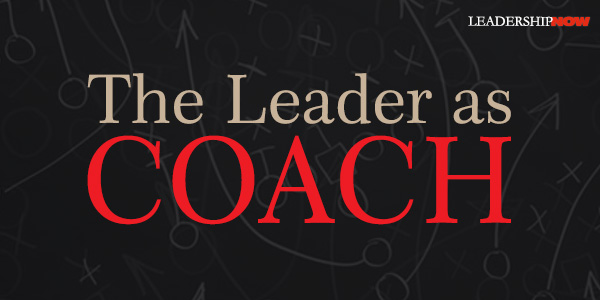
CONSULTANT David Noer makes an insightful comment in Learning Journeys about coaching others: The great teachers of my life gave me a precious gift. It was not a tool, process, or technology; it was something deeper and more profound. They helped me understand that what really matters when helping people or organizations through change and transition is not technique but authenticity, vulnerability, and empathy. They taught me that connecting with others at the warm, messy, and unscientific level of the human spirit is a prerequisite for any methodology or process. I learned that technique without a grounding in empathy and vulnerability is sterile and artificial. I learned, as Larry Porter, one of my many great teachers, once said, “In the final analysis, the only tool worth a damn is our own warm body.”Heart is a distinction of great leaders. We need to have deep convictions about helping others to succeed. The connecting with others grounded in empathy and vulnerability that Noer writes about is not something we can work up. It comes as the result of our own struggles and growth. It is through our own struggles that we come better prepared to help others. Sometimes we look down on people who are struggling. That’s not only ignorant, it’s arrogant. Remember they’re growing. It’s an amazing process. (If we knew better, we might even be struggling with the same thing they are.) We can’t see ourselves as the great teacher imbued with special knowledge and wisdom. We can’t make it about our need to be helpful as often happens. We are a facilitator of their growth. If we’ve been growing, we can often help them to see their situation differently. A well-placed comment or thought can help them to make new connections in their worldview. I think being there is half the battle. It’s difficult at times to truly focus on another person’s aspirations and needs, but you can’t lead without it.  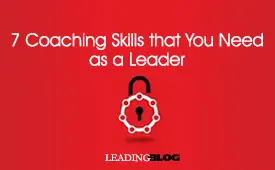 
Posted by Michael McKinney at 10:31 AM
05.29.07

The New Golden RuleDo we need a new Golden Rule? It’s not uncommon to find in modern literature, the call for a new golden rule. Is the Golden Rule adequate in today’s world?The Golden Rule says, “Do unto others as you would have them do unto you.” Some would say that this just isn’t enough: in our global village, we need to consider cultural differences and the desires of others. This thinking suggests that we humans have never found ourselves in a multicultural setting before now. The new Golden Rule goes something like this: Do unto others as they would have you do unto them. The need for a change really reflects a narrow view or understanding of the original intent of the Golden Rule.  In fairness, calls for a new rule points to the very real need to explain the intent of the original. That it should and would need to be explained properly to each succeeding generation is a fact of life. In fairness, calls for a new rule points to the very real need to explain the intent of the original. That it should and would need to be explained properly to each succeeding generation is a fact of life. It should be noted that the term “Golden Rule” does not come from the Bible. However, the Bible does say that whatever you want men to do to you, do also to them. The rule has been stated in many ways for millennia. Almost 4000 years ago, written on papyrus, we have from the Egyptian story, The Tale of the Eloquent Peasant, "Do for one who may do for you, that you may cause him thus to do." Similarly, the Roman statesman and philosopher Seneca instructed leaders to "Treat your inferiors as you would be treated by your superiors." (Epistulae morales ad Lucilium 47:11) Clearly, human nature hasn’t changed much. Rules are tools designed to get our thinking and behavior to a place that we might not naturally go to on our own. As a rule, the Golden Rule is no different. It is an attempt to guide us to the thinking behind the rule so that it is manifested in our behavior. The Golden Rule is an introduction to a lesson on responsibility, awareness, ethics and outgoing concern for others. The principle the rule is trying to get at is one of selfless service to others. We naturally look at things from our own vantage point. So it’s not surprising that we look at the rule selfishly as well—from our own viewpoint. The rule has within it the implicit instruction to treat others thoughtfully—in the same manner of outgoing concern—as you would like them to treat you. Certainly none of us would want others to treat us in a way that shows disregard for our personal needs and feelings. The principle of the Golden Rule is selflessness. It is not meant to imply that you should do for others exactly what you want them to do for you. It’s not about you. This rule is about how to treat others. It’s not a manipulative behavior to get others to do something for you. It’s an approach to how you should be treating others regardless of how they treat you. It’s not a training behavior to get others to do a specific act for you. “I did this for you, so now you should do this for me.” We are to treat others—in the same manner—as we would like to be treated by anyone we come into contact with. The Golden Rule is a lesson that can hardly be introduced to children soon enough. It’s a prescript that should be followed throughout life. This is a tall order, but something every leader should strive to develop. It is the essence of service and servant leadership. Properly understood, the Golden Rule encompasses cultural and personal differences. Certainly, the intent of modern literature on this issue is to jog our thinking from a self orientation to an other orientation in our dealings with others. As is, the Golden Rule, if practiced, would go a long way to improving our relationships.
Posted by Michael McKinney at 09:05 AM
05.25.07

Developing a Respectful MindHoward Gardner writes in Five Minds for the Future, "Adolescents have potentials for leadership, or for enterprise, that can be marshaled for diverse ends; it is up to their elders—parents, educators, community leaders, slightly older and more mature peers—to influence how these potentials are mobilized." This is a significant thought worthy of repeated reflection. It describes the process of character development throughout our lives. We might consider what functions we occupy and the influence we are having on others.In any event, Gardner believes that the mobilization of these potentials should progress in five directions that can be manifested in five minds. They are: the disciplined mind (a mind trained on a specific scholarly discipline, craft or profession), the synthesizing mind (a mind that can create value from information), the creating mind (a mind that can break new ground), the ethical mind (a mind that contemplates meaning in work and life and then acts on it) and the respectful mind (a mind that welcomes differences between group and individuals). Looking specifically at the respectful mind, he writes that “rather than ignoring differences, being inflamed by them, or seeking to annihilate them through love or hate, [he] would call on human beings to accept the differences, learn to live with them, and value those who belong to other cohorts.” The respectful mind, like the other four qualities of mind, Gardner believes is a kind of thinking or attitude we will need to have to thrive during the eras to come. He says “eras to come” because while we have always needed this quality of mind, it has been a kind of option. Meaning I assume, that the repercussions of not having it were better contained in times past. However, today we are so interconnected that our very survival depends on it. In a global sense he is right. While all of these minds interact with each other, the respectful mind, I believe, would seem to be the cornerstone.  Without it we limit our input—distance ourselves from reality—and virtually assure that we are not effective with others. Consequently, the respectful mind is the first mind we should seek to develop in children and demand from ourselves. Without it we limit our input—distance ourselves from reality—and virtually assure that we are not effective with others. Consequently, the respectful mind is the first mind we should seek to develop in children and demand from ourselves.
Posted by Michael McKinney at 12:22 AM
05.22.07

Do You Have All the Answers?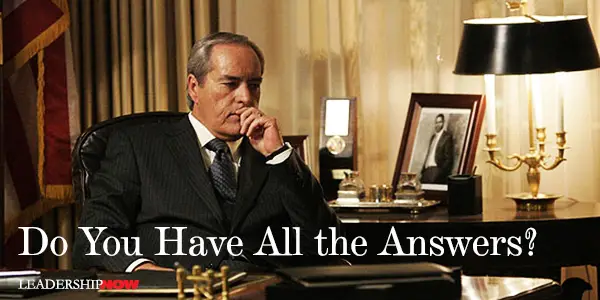
THE President of the United States, on the Fox TV show 24, made a comment regarding leaders and followers that we all—celebrity or not—should consider before trying to weigh-in on the decisions that any of our leaders make. We all too often offer opinions on what should have been done in hindsight based on such limited information. This doesn’t mean that we should be blind followers, but that any criticisms we have should be tempered with humility and an understanding that the information we have at our disposal is most often simplistic at best. We should judge the way we would want to be judged. On the show, President Noah Daniels reflected, “You know Tom, it’s easy to think you’ve got all the answers when none of the ultimate responsibility lies with you. But sittin’ in this chair.… Until you sit in this chair, you don’t know anything.” How true and how easily we forget. John F. Kennedy once said, “No one has the right to grade a President—not even poor James Buchanan—who has not sat in his chair, examined the mail and information that came across his desk, and learned why he made his decisions.” Michael Watkins wrote on the Harvard Business Review site about a circular prison design whereby the inmates could be observed by a centrally-located warden. “The prisoners were unable to tell at any given moment whether or not they were being observed. The goal was to create what Bentham described as a debilitating ‘sentiment of an invisible omniscience’ and ‘a new mode of obtaining power of mind.’” As a society, are we moving to such an Orwellian approach to others? He observes: But we are hurtling toward something that could be far worse, the multitudes observing every act of the powerful, waiting (even hoping) for the fatal flaw to emerge, and then inciting the web-based mob to cry for blood.
Posted by Michael McKinney at 08:49 AM
05.21.07

The Innovation Mindset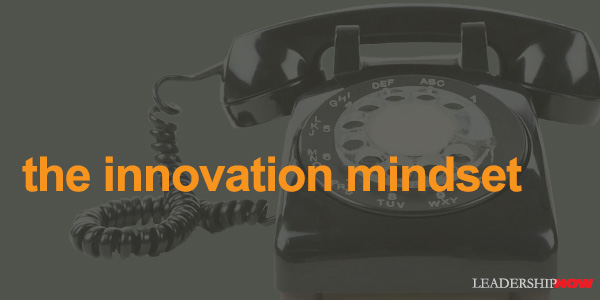 INNOVATION involves looking for change for the purpose of exploiting it. As Drucker explained, it’s really a social or an economic term as opposed to a technical term. It's a term that is thrown around far too loosely today. Rarely does a bright idea become an innovation. It usually stays what it is—a bright idea. Scott Berkun helps us to get some perspective on innovation in his book The Myths of Innovation. In his excellent and highly readable discussion of innovation, he explains the truth behind our popular ideas and misconceptions about innovation. While there may be no methodology, there is some good advice. He offers some attitudes one can adopt that are conducive to creating paths to innovation.
INNOVATION involves looking for change for the purpose of exploiting it. As Drucker explained, it’s really a social or an economic term as opposed to a technical term. It's a term that is thrown around far too loosely today. Rarely does a bright idea become an innovation. It usually stays what it is—a bright idea. Scott Berkun helps us to get some perspective on innovation in his book The Myths of Innovation. In his excellent and highly readable discussion of innovation, he explains the truth behind our popular ideas and misconceptions about innovation. While there may be no methodology, there is some good advice. He offers some attitudes one can adopt that are conducive to creating paths to innovation.
First, we must understand how we cloud our own judgment. We all make decisions based in part, on how we feel. “The best business opportunity might be the least interesting personal challenge, and vise versa.” Second, be willing to step back. “Many successful innovators work passionately, but periodically step back and ask, ‘What is happening in the world that impacts my goals?' or ‘What else is my work good for?’ Innovation is powered by the combination of intensity and a willingness to reconsider assumptions, minimizing the chance of following dead ends and maximizing the potential for finding better paths.” Third, keep ego in its place. “Changing the world or revolutionizing an industry is a nice fantasy, but it’s foolish to start with those ambitions because they’re out of any individual’s control. It makes more sense to attack a specific problem in a known field; only as successes accrue should the ambition grow.” Drucker wrote, “Those entrepreneurs who start out with the idea that they’ll make it big—and in a hurry—can be guaranteed failure. They are almost bound to do the wrong things.” Finally, honor luck and the past. “Honoring luck doesn’t diminish an accomplishment: it’s an acknowledgment to others that you can do everything right and fail, and do many things wrong and succeed. When looking at the great innovations of the past, Berkun cautions us that “these glorified accounts present innovation in a distorted way that is impossible to achieve because the neat arcs of progress, clear sense of purpose, and certainty of success are heavily shaped, if not invented, by hindsight.” Innovation is messy, hard work. 
Posted by Michael McKinney at 11:11 AM
05.17.07

Artists as Leaders of Society Cutietta began by asking the graduates how they would have an impact on today’s world with degree in music performance. He stated, “Whether people know it or not, our society looks to its artists for a type of leadership that is not found elsewhere. When artists speak people listen. I think subconsciously, society believes that artists possess a certain type of wisdom, a certain outlook on the world, a certain trustworthiness that is seldom found elsewhere." By way of example, he mentioned the world-class cellist Mstislav Rostropovich who died last month. Rostropovich was a defender of human rights in the former Soviet Union. Cutietta noted, “He used his music and his fame to be an inspiration to many artists and writers to think and act independently. His call was heard and respected by artists and non-artists alike because people inherently feel that artists, by their very nature, have something important to say. 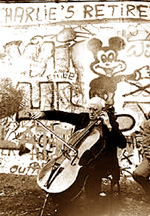 “When the Berlin Wall fell (November 1989) Rostropovich used his music to highlight the importance of this event. He held an impromptu solo concert at the base of the wall. But he didn’t play flamboyant, celebratory fanfares, he performed Bach. What a great choice. What other music could capture the depth of emotions, the implications and complexities that the collapse of the wall really meant? No words could have captured that moment in time with the expressive subtleties as that solo performance. “Likewise, could we even imagine the civil rights movement without the songs that moved us to tears and action, the Viet Nam war without many of the protest songs, or Bernstein’s Mass, or Yo-Yo Ma using his influence to highlight the impact Asia has had on Western art music. “For some reason too many musicians are silent. I fear that something has changed and artists don’t see themselves as leaders of society. “If artists abandon this role, the leadership paradigm loses its balance of power. For our future to remain bright, we need artists to be leaders to help envision the positive future that can be, by helping point out the present that shouldn’t be.” Has this degree prepared you for the real world? Cutietta asked. “I hope not. If that is all it has done, then you and your teachers have wasted your time. The more important question is whether your degree prepares you to change the real world; to make it a better place for all of us to live in.” Cutietta believes that their degree has prepared them to make an impact on the world because he told them, "you understand perfection. You understand hard work. You understand self-discipline. You understand working intimately with others towards a goal. And without a doubt, the most important thing you understand is the importance, the power, and meaningfulness of pure beauty. “All of you share a very real and a very unique responsibility to lead, to be a leader and to make a difference; To use your phenomenal talent and training not just for self-serving gains, not just to become famous, but to truly make a difference.” NOTE: The Colburn School has a great concert hall – Zipper Hall – but it also works as a good meeting venue for less than 400 people at a reasonable price. So, if you’re in downtown Los Angeles and need a place to meet you might check it out. It’s situated across from Disney Concert Hall and the LA Music Center.
Posted by Michael McKinney at 08:54 AM
05.16.07

Solid Connections in a Liquid WorldDr. Ralph Shrader, Chairman and CEO of Booz Allen Hamilton, recently stated that “we have to get beyond our human tendency to want a fixed certain state. It simply doesn’t exist.” To be effective in this kind of environment we need solid leadership and solid linkages with other people. While the typical response would be to demand more, he contends that less is more. “Less is more solid.” “When it comes to leadership, I believe less instant is more thoughtful.” Leaders need to communicate a clear vision and clear set of priorities. This mean that everyone needs to not only understand where we are going and why we are going there, but what trade–offs should be made to achieve the most important priorities. When push comes to shove our followers “need to know what comes first—whether it is expediency, economy, or an overarching principle.” Solid leadership in a liquid world also requires a common understanding and consistent measures of success. You can choose metrics that can position you in the best light, “but in reality, it only hurts [your] ability to build the institution because it can mask true performance.” Additionally, solid leadership in a liquid world requires “informed—but timely and unambiguous—decision making.…Leadership attention is perhaps the scarcest resource in today’s highly networked world….Therefore we as leaders need to focus our attention on the most important matters. My strategy on focusing attention is to be minds on, but hands off. By minds on, hands off, I mean that leaders are responsible for everything important—but we don’t have to actually do everything important.” This requires that we slow down to think. “Thoughtfulness and clarity cannot be compromised.” Finally, Shrader brought out another important element in his speech for making solid connections in a liquid world—personal linkages. “Less virtual is always more personal and more powerful.” We need to use technology for what it does best—store, retrieve, compute, and mine data—and use people for what we do best—imaging, design, dream, and relate. At the end of the day, one of us, not an information system must make all the big decision. We’re the ones who need to be minds on.
Posted by Michael McKinney at 09:59 AM
05.14.07

Alias Smith and Jones on Leadership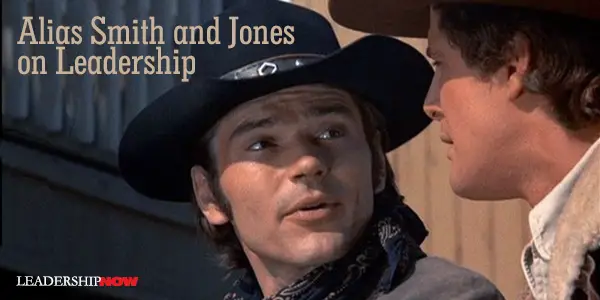
Hannibal Heyes to Kid Curry: “Listen, when the leader of the gang tells him to do something, don’t he have to do it?” Curry: “Yeah, that’s my understandin’.” Kyle (gang member): “But, what makes you such a great leader Hayes is that you never tell no man to do no thing you wouldn’t do yourself.” Heyes to Curry: “You wanna be leader?” Curry: “After you!”
Posted by Michael McKinney at 09:19 AM
05.10.07

Embracing The Dip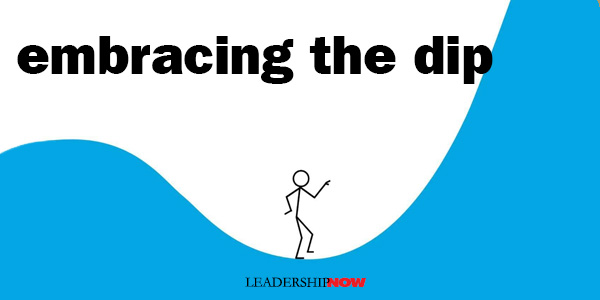
Seth Godin is a perennial favorite because he is among other things, what Saul Bellow called, a first class noticer. He gathers information and makes valuable and practical meaning from it. He doesn't skip the hard questions. His book The Dip: A Little Book That Teaches You When to Quit (and When to Stick) is no exception. What is The Dip you ask? Seth defines it as “the long slog between starting and mastery. It's any rough patch you have to get through before achieving your big goal . . . if in fact you're chasing the right goal.” This short read – 86 pages – is really about understanding what needs to be done to make the move from mediocrity to greatness. It's about quitting what gets in the way of you being the best. As Seth points out, it takes a lot more than saying, "I want to be the best." It also means letting go of those things that for you are dead-ends. Quitting those things where you are wasting your time and energy and refocusing your resources in The Dip – that place where you can achieve the greatest accomplishment. This isn’t a new idea, but it is the best, most memorable presentation I have ever seen of it. Strategic quitting is the secret of successful organizations. Reactive quitting and serial quitting are the bane of those that strive (and fail) to get what they want. And most people do just that. They quit when it’s painful and stick when they can’t be bothered to quit.Finding and successfully moving through your Dip is really a matter of counting the cost. Consider first, if you have the resources to carry on and then, if you succeed, is it worth the effort? The Dip is why everyone is not doing what you're doing. It is also why you are not the “best in the world” at what it is you do. It’s where most people get stuck. Anything worth doing has a Dip. The Dip is actually a good place to be Seth says because if you can get through it, you can win where most others quit. So, you want to find your Dip. It’s the incredibly difficult challenges (the Dips) that give you the opportunity to pull ahead.If you’re looking for some inspiration you might try reading New Ideas from Dead CEOs by Todd Buchholz. He writes: “Each of these CEOs failed at some point. Faced with bankruptcy and defections, they could have succumbed to psychological depression or the siren call of politicians offering class warfare. He each heard nos, the tsk-tsks of friends, and a schadenfreude chorus scoffing at their failure. But they pushed on, energized by passion, ego, money, and the promise of glory. You cannot build a successful business or economy on the kindness of strangers. These CEOs relied on more dependable, more human drives. Drives that took them on fascinating rides.” In short, they embraced the Dip. Here’s a tip. If you can’t measure your progress, if you feel like you are working harder and harder to get nowhere, then you’re probably putting your efforts into a dead-end initiative. You have the wrong strategy. You need to let go and find your Dip. With a little introspection, this has the potential to be a life changing book. Take the time to read it and apply it. You can read it in one sitting but you’ll think about it for days. A few people will choose to do the brave thing and end up the best in the world. Informed people will probably choose to do the mature thing and save their resources for a project they’re truly passionate about. Both are fine choices. It’s the last choice, the common choice, the choice to give it a shot and then quit that you must avoid if you want to succeed. 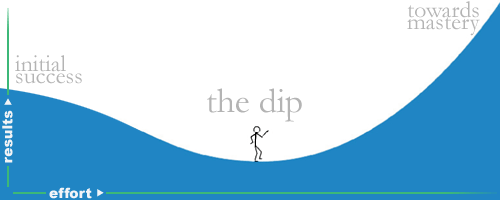  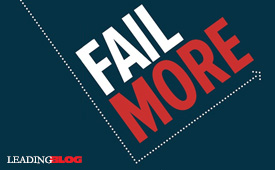 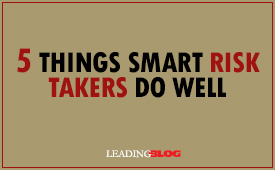
Posted by Michael McKinney at 12:15 AM
05.09.07

Lucky in Leadership "Aside from effective management of politics, there’s a certain amount of luck involved in being a successful leader. I don’t think anybody talks about that, but the truth is, any leader could be pumping gas instead of running a company. Sometimes your best plans go to hell, and you still manage to be the last one standing. We can call that skill or street smarts or panache, but to me we should cut to the chase and acknowledge that it’s pure luck."
Posted by Michael McKinney at 08:59 AM
05.07.07

What It Takes to Lead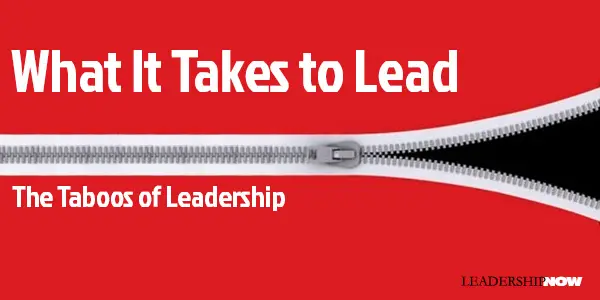
TONY SMITH believes that much of the leadership literature today dances around what it really takes to lead because there are some areas that are politically incorrect or just too difficult to talk about. As a result we have created a “sanitized, air-brushed, or glorified picture of leadership that masks or disguises reality” and we never really get at what leaders do and why they do it. Through his frame of reference, that of executive coach and advocate, he adds great value to our understanding of the realities of leadership even if at times, his conclusions derail when trying to understand leadership at any other level that that of the CEO. In his new book, The Taboos of Leadership his observation that “leaders who are successful never quite fit the theories we apply to them and are always messier and more complex than we would predict” is quite true. It is an aspect that is missing from or far too understated in most leadership literature. Perhaps that explains why international leadership expert Manfred Kets De Vries, wants to put the leader on the couch.Smith writes: There is nothing tidy or clean about leadership. It’s messy, but so is the rest of life. He asks ten taboo-braking questions: What does it take to lead? Does charisma matter? Is being political a bad thing? Do women make better leaders? What about the trappings of power? Should the leader play favorites? Do leader’s really want to groom a successor? Should a leader’s work be their life? Should leaders put aside their own motivations and interests and serve only the motivations and interests of their people? Do leaders cultivate loneliness deliberately? He left out a direct discussion of followers and authority. These are two areas that are misunderstood as often as they are poorly executed. The proliferation of “leaderless organization” literature will attest to that fact. Instead of sugar-coating or dismissing these topics, we should seek a better understanding of these vital and necessary issues. Smith suggests: “Perhaps we should know, or at least recognize, the risk-reward ratio of leadership a little better before we judge our leaders, or decide to become one ourselves.” That point can’t be emphasized enough. 
Posted by Michael McKinney at 12:28 AM
05.04.07

Presidential Courage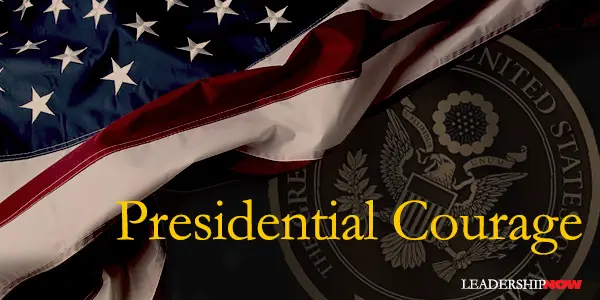
MICHAEL BESCHLOSS has written a series of stories inPresidential Courage about how nine American Presidents have, at crucial moments, made courageous decisions for the national interest even when they knew they might be jeopardizing their careers. The stories are brief overviews of trying times but are both poignant and encouraging. In his epilogue he writes: From his own reading of history, John Kennedy feared that the changing political environment was making it more difficult fro Americans to practice the kind of leadership that had shaped our past. Beschloss continues with this prescription: The ancient Romans surrounded their young leaders with paintings and sculpture to encourage qualities of greatness. Surround yourself with these stories. 
Posted by Michael McKinney at 10:58 AM
05.02.07

Ignition PointsHow do you lead in a situation where you are not in control? Vince Thompson asks in his book Ignited, “Can the principles [CEOs] use to run their companies really work for managers in The Middle like us—managers without the ability to reshape businesses, redirect strategies, or even (in many cases) to hire, fire, and reward employees as we see fit? The answer is a qualified no.”Working from where you are with a foundation of authenticity and self-discipline, you can help to make the necessary changes in your organization and create more purpose in your leadership role. Thompson defines seven ignition points—functions or tools you can develop and use to create unique value to your organization.  The first of these is the power of the Process Master. “One of the most powerful ways for a manager in The Middle to add value is by knowing the processes his company engages in … and knowing them cold.” In addition to specific steps in the process, “It also means knowing the individuals who handle the processes, along with their quirks, strengths, shortcomings, needs, and vulnerabilities.” A big picture thinker. Second, is the power of the Linkmaker. “Great managing is largely about Linkmaking—knowing the people around you, understanding what makes them tick, And connecting their knowledge and skills in ways that will make powerful things happen for the organization.” Third, is the power of the Translator. The translator helps people in the organization to see each others viewpoints and values to help unite them behind shared organizational goals. It’s the ability to translate organizational goals “into actionable ideas that our diverse workforces can ll relate to, buy into, and support.” Fourth, is the power of the Scout. The Scout understands the landscape—the environment, the customers and vendors—the organization is functioning in and communicates that throughout the organization. The Scout tracks people’s changing attitudes, interests and ideas and works to develop its full potential for the benefit of the organization. Fifth, is the power of the Pilot. In the role of Pilot, you need to be “looking for threatening shoals and promising open sea lanes, and working to steer your company away from the former and toward the later.” Sixth, is the power of the Bard. “The Bard is an ignited manager with the ability to record and pass on organizational history … and the evocation of relevant facts and comparisons from past events when current decisions are being weighed.” Why is this so important? Because you can “help others understand where they fit into that story.” That’s vital. Finally, he describes the power of the Healer. “Rather than treating people like cogs in a machine, smart managers empathize with the struggles and aspirations of their team members. They realize that each one is an individual with strengths, weaknesses, and emotions that must be understood fully.” The ignited manager “knows that motivating people is, in part, about nurturing their hearts and minds. The ignited manager “knows that motivating people is, in part, about nurturing their hearts and minds. Thompson begins with a short quiz to help you identify your mindset in relation to the ideas he presents in this book. He finishes with steps you can take for “getting your idea sold and ensuring that you achieve the success and recognition you’re earned.”
Posted by Michael McKinney at 12:51 AM
05.01.07

Leadership Books: May 2007Here's a look at some of the best leadership books to be released in May.
Posted by Michael McKinney at 08:50 AM
|
BUILD YOUR KNOWLEDGE


How to Do Your Start-Up Right STRAIGHT TALK FOR START-UPS 
Grow Your Leadership Skills NEW AND UPCOMING LEADERSHIP BOOKS 
Leadership Minute BITE-SIZE CONCEPTS YOU CAN CHEW ON 
Classic Leadership Books BOOKS TO READ BEFORE YOU LEAD |
|